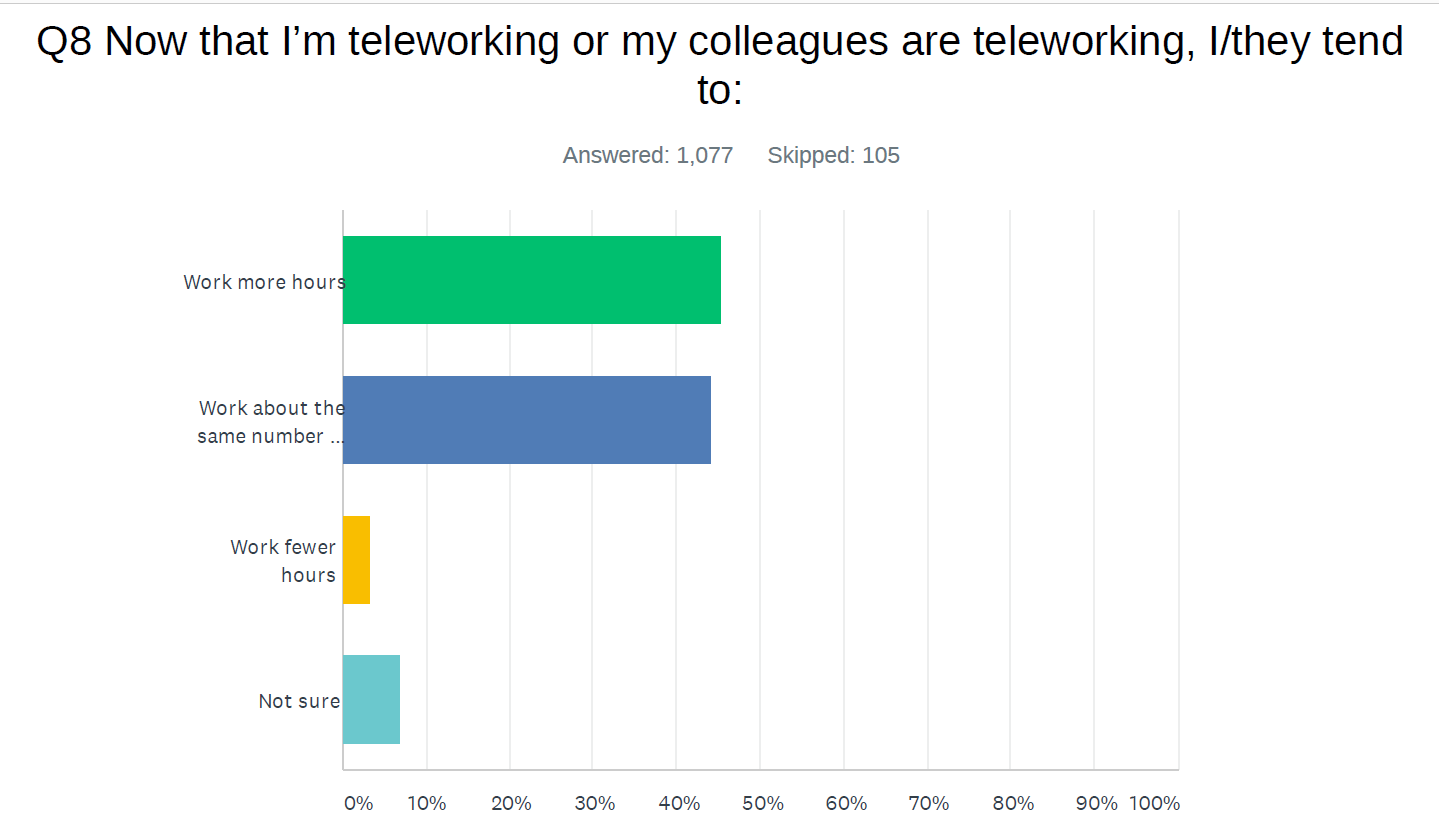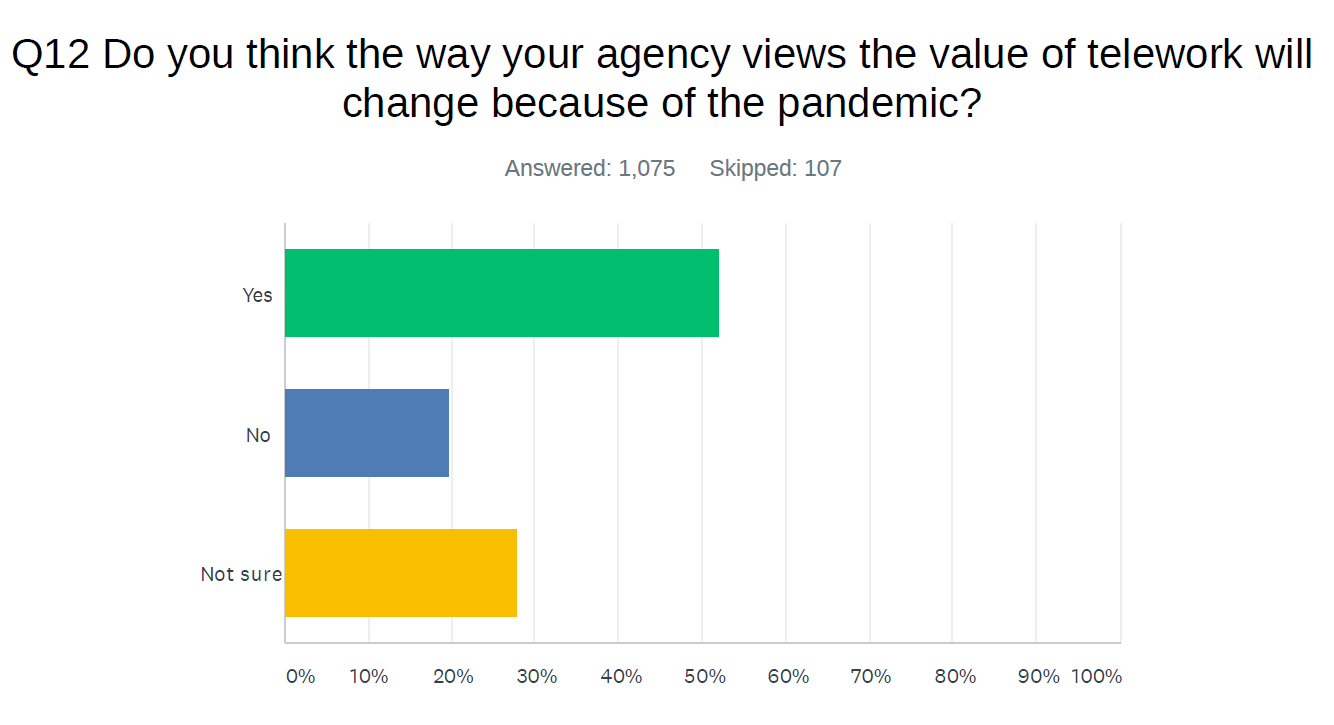Feds are enjoying full-time telework but doubt agencies will embrace it later
A Federal News Network survey found the vast majority of employees say they're more productive and working more or the same number of hours at home compared to the...
A majority of federal employees are teleworking productively — even happily for some — during the current pandemic, but few believe their agencies will embrace it or drastically expand it whenever things return to some semblance of “normal.”
The commute alone — a few steps to the kitchen table instead of an hour one way in the car — is a relief for many, according to a Federal News Network survey of nearly 1,200 respondents.
Work — sometimes more of it now than ever before— is getting done.
Even the initial hiccups with the virtual private networks (VPN) and home internet connections have subsided.
There’s at least one (acting) cabinet-level secretary who may feel the same way.
“I think there was a perception that the efficiency of the department would somehow drop off with having the vast majority of folks teleworking. We’ve actually seen the opposite of that,” acting Homeland Security Secretary Chad Wolf said Thursday during an online conversation with Auburn University’s McCrary Institute. “We’ve seen great efficiencies. Utilization is higher. People are working just as much at home as they are here in the office. Perhaps you can avoid those long commutes and do things remotely just as you do here.”
An overwhelming majority of survey respondents are currently teleworking and have been for three weeks. More than half, 52%, said they were more productive at home than the office, while another 40% said their productivity was about the same.
“There was a set-up and learning curve,” one employee said. “I can concentrate for extended periods of time. People aren’t constantly dropping into my cubicle to chat. With email or even Skype, there’s an assumption that I will finish my current task, then get back to my coworker. In person, there was an assumption that I would immediately drop everything to solve their issue, and it takes time to get back into a complex task after the flow is interrupted.
They even said their colleagues seemed more productive, though it’s often tough to tell when you’re no longer working next to them anymore.

There are, of course, some exceptions.
Federal employees with young or school-aged children at home said it’s been difficult to balance work and family needs during the day.
“I’m only less productive due to childcare issues,” one respondent said. “My wife and I are both feds and are expected to work full time and provide full-time daycare to a three year old and 11-month old.”
Several federal employees said their days had been eaten up with back-to-back 30-minute meetings, leaving them little time for much else.
Life is also quite different for employees usually working with classified systems. Some respondents said they were still traveling to the office one or two days a week to handle that work, while others said their workload is much lighter.
“My job involves classified systems, so it is mostly busy work and online training from home,” one employee said. “But my immediate management has convinced those up the chain that this is acceptable. And they are actively engaging with other offices to convince the other offices that only mission-critical work is worth us going into the office. I can feel my work ethic being slowly eroded.”
Nearly 90% of respondents said they worked more or the same number of hours in this new environment.
“My daily round trip commute is three hours by car and Virginia Railway Express train,” one employee said. “I use some of that time and extra energy to work.”
The extra hours, however, can be taxing, and many respondents said it’s difficult sometimes to unplug and unwind.
“Home life and work life are blending overly much and I find I’m starting earlier, returning to work in the evening and working weekends,” another employee said. “I’m sitting all day, going from one Zoom right into the next, and people are calling more [instead of having] just a quick doorway conversation.”
IT challenges also seem to have subsided; 59% said they haven’t had any issues.
About 34% said connections to agency’s networks were slow, and another 10% said their organization had to find them laptops and other equipment for remote work.
“In the beginning the VPN wasn’t equipped to handle the volume of users and I had issues getting in,” one employee said. “It appears to have been resolved after the first week. My agency did have some workarounds in the interim. I do use my own monitor because the government laptop screen is tiny.”
A GSA employee said his laptop and other equipment work more smoothly at home than when he’s in the office.
Another respondent gave a shout-out to the U.S. Agency for International Development chief information officer.
Several employees said they missed their printers and dual monitors at the office.
Despite some hiccups, 35% of respondents said their agency’s technology seemed better than they initially thought. Just 8% said their organization’s IT was worse than expected.
Feds largely pessimistic about potential for later telework expansion
Federal employees were far more mixed about how the current environment might change the prospects for telework in the near or distant future.
For the agencies that already offer regular telework, those schedules will resume as usual, respondents said.
But many employees offered a far more pessimistic view.
“I honestly believe even after this our leadership’s ossified opinion of what constitutes [as] effective work will prevent meaningful continuance of telework programs,” one respondent said.
Several respondents mentioned the current policies at the Agriculture Department and Social Security Administration. Both organizations limited telework in recent years.
“Our agency took away one day of telework from us before the pandemic, so I do not trust them to give it back once it is over,” an employee said.
Many respondents said they doubted their agency’s management would abandon their long-held views on telework, even if their employees have kept up with or exceeded performance expectations.
“Leadership is not a big fan of telework and so it’s hard to tell,” one employee said. “If telework flexibilities are not expanded, I plan to actively look for a job elsewhere, a telework-friendly organization.”

Another respondent said: “It’s been made clear that this is a temporary emergency tactic. The agency does not trust us and doesn’t have the resources to support telework for all its employees.”
Others, however, offered a more hopeful or measured outlook.
“[It’s] been an excellent experience,” one respondent said. “The DoD entity has been flexible and able to adapt quickly given the pandemic. Also, this situation has resulted in less traffic, more productivity, and legitimate discussions about telework on a full-time basis for some personnel after the pandemic is over.”
Wolf suggested it may be worth investigating how DHS could broaden telework in the future, though he didn’t offer many details.
“How does that work over the long term and not just for six-or-seven months as we get through this pandemic? What does that mean for the larger mission, for a department in homeland security where we have both front line operators who stand guard every day but we also a variety of support functions, analysts and others, who back them up,” he said.
Still, others stressed flexibility in their work. When asked to describe all they had learned about their telework experience during the pandemic, 76% of respondents said their work is about what they do, not where they do it.
Another 58% said they were impressed by the tasks their organization could accomplish remotely.
“Everybody should be allowed to try telework if they want to,” an employee said. “If you goofed off at the office, then you’ll goof off at home. If you are a good worker while they’re watching then you will continue to be that good worker at home. It’s not magic.”
Nearly Useless Factoid
By Alazar Moges
One thing everyone knows of the Amish people and their culture is their rejection of technology. But despite that, the world has changed drastically in modern times so much so that there are actually computers used by some Amish people that have no internet, video, or sound that they use for basic word-processing, spreadsheets and accounting to make work easier. The Amish can justify these uses for business reasons as long as they are kept out of the home.
Source: National Public Radio
Copyright © 2025 Federal News Network. All rights reserved. This website is not intended for users located within the European Economic Area.
Nicole Ogrysko is a reporter for Federal News Network focusing on the federal workforce and federal pay and benefits.
Follow @nogryskoWFED




